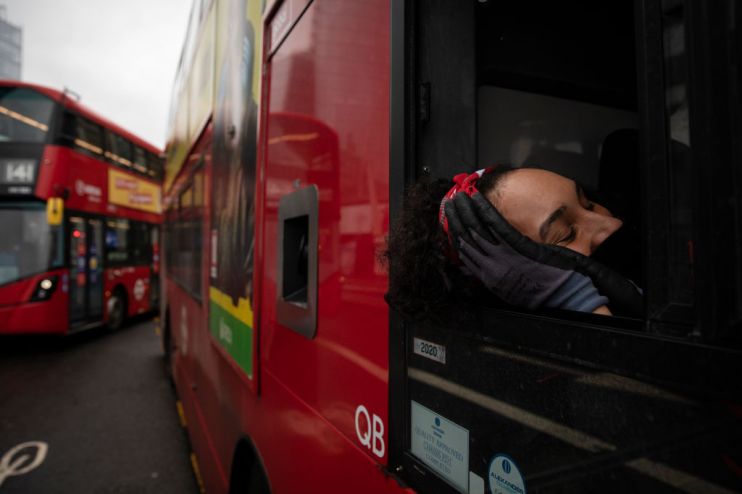More than 2,000 TfL bus drivers have caught Covid-19 since October

More than 2,000 Transport for London (TfL) bus drivers contracted Covid-19 in the four months between October and January, new data from the operator has shown.
According to figures collected from the contractors which run the capital’s bus services, 2,017 of around 25,000 drivers caught the virus in that period.
The operator only started collecting data from its contractors in October. This is because of a lack of widespread testing beforehand, a spokesperson said.
The figures, which were obtained by Freedom of Information request, come as it was confirmed that 51 bus drivers have now died of the disease.
That is out of the total 89 TfL staff who have lost their lives as a result of the pandemic, Mayor Sadiq Khan confirmed at a board meeting yesterday.
According to the data published by the ONS in December, bus drivers are among the professions most vulnerable to the pandemic. Across the country, there had been at that point 83 bus and coach driver deaths, a rate of 70.3 per 100,000.
The situation is acute in London, with the number of fatalities so far suggesting a death rate far more than double the national average.
Last month City A.M. revealed the conditions that London bus drivers had been forced to work in during the pandemic thanks to the “toxic” nature of the bus industry.
Speaking on condition of anonymity, drivers said that they had been “abandoned”, and had to patch up their buses and take protective steps on their own.
In an accompanying statement to the Freedom of Information request, TfL said it had done “all we can to protect transport workers”.
Before the Open: Get the jump on the markets with our early morning newsletter
It said it had sealed drivers’ cabs, improved ventilation on buses and enforced a stricter cleaning regime across the network.
The operator also said it had enforced mask wearing on buses, and social distancing at bus garages.
TfL also commissioned a report from University College London into the risks drivers were facing from the pandemic and the best measures to combat them.
The data suggests that bus drivers working for some companies were more likely to catch the disease than those working for others.
For example Stagecoach saw one in every eight drivers – 366 – catch the disease, while for RATP, which commands roughly the same market share, the figure was one in 17 -177.
A Stagecoach London spokesperson said: “We continue to take the safety of our customers and our colleagues extremely seriously and have in place extensive hygiene and other measures to protect people. The data reflects the fact that we operate services in east London where community transmission rates have been significantly higher than other parts of the capital.
“In addition to our preventative measures, we have been part of the ongoing and regular testing of the city’s transport network for Covid-19 and this has to date found no trace of the virus on our services which were tested.”
Uno, on the other hand, saw nine out of the 10 bus drivers at its one garage in Hatfield test positive for the disease. The firm is run by the University of Hertfordshire.
City A.M. has contacted Uno for comment.
Conservative London Assembly Member Keith Prince said that the figures were “shameful”.
“London’s heroic transport workers have been on the frontline throughout the pandemic and kept our city moving. The Mayor and Transport for London’s failure to keep them safe is deeply shameful”, he told City A.M..
“Sadiq Khan cannot continue to ignore the concerns of London’s transport workers. As Chairman of TfL, Khan must ensure transport workers receive higher-grade protective equipment and properly enforce the mandatory face-covering rule.”
He also called for bus drivers to be vaccinated as soon as possible.
Lilli Matson, TfL’s Chief Safety, Health & Environment Officer said: “Coronavirus has had a devastating impact on our city and it is tragic that we have lost colleagues to this virus. Our thoughts remain with their family and friends.
“Bus drivers have played such a vital role in transporting key workers and we continue to do everything humanly possible to protect them. This has included a relentless focus on cleaning, including in bus garages and rest rooms, ensuring that driver’s cabs are sealed and improving ventilation systems to make fresh air enter the driver’s cab.
“In addition, we continue to work with operators to ensure drivers either with coronavirus or symptoms are entitled to sick pay from day one, discouraging anyone from attending work when they shouldn’t.”